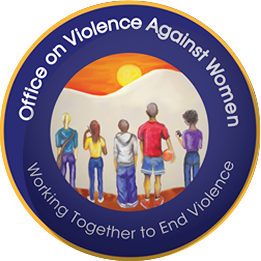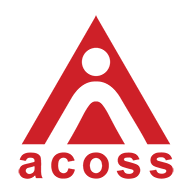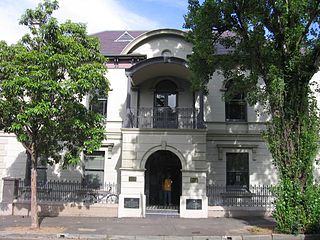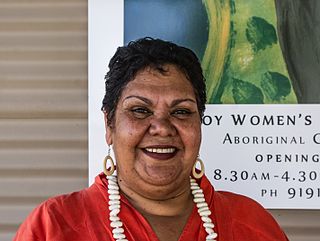
The United States Office on Violence Against Women (OVW) was created following the Violence Against Women Act (VAWA) of 1994. The Act was renewed in 2005, 2013 and again in 2022. The Violence Against Women Act legislation requires the Office on Violence Against Women to work to respond to and reduce violence against women in many different areas, including on college campuses and in people's homes. VAWA requires Office on Violence Against Women to administer justice and strengthen services for victims of domestic violence, dating violence, sexual assault, and stalking.

The Australian Council of Social Service (ACOSS) is an Australian organisation that advocates for action to reduce poverty and inequality, and is the peak body for the community services sector in Australia. It was formed in 1956.

Redfern Legal Centre (RLC) is an independent, non-profit community legal centre established in 1977 and located in the Sydney inner-city of Redfern, New South Wales. It is part of a network of four inner-Sydney region community legal centres, including the Inner City, Kingsford, and Marrickville Legal Centres. Redfern Legal Centre is a member of Community Legal Centres NSW, the state peak representative body for community legal centres in NSW and also Community Legal Centres Australia, the national peak representative body for community legal centres across Australia.
House Of Ruth Maryland is a non-profit organization that was founded in 1977 by a coalition of women's organizations, religious groups, service providers, and elected officials to provide a safe haven for victims of domestic violence and their children. It is headquartered in Baltimore, Maryland, United States and has offices throughout the state of Maryland. House of Ruth Maryland leads the fight to end violence against women and their children by confronting the attitudes, behaviors and systems that perpetuate it, and by providing victims with the services necessary to rebuild their lives safely and free of fear. Funding for House of Ruth Maryland is made possible through private (53%) and government (38%) funds, and other sources (9%) including investment income, training and client fees resulting mainly from the Gateway Project. Since its inception, The House of Ruth Maryland has served over 100,000 victims of domestic violence.
A community legal centre (CLC) is the Australian term for an independent not-for-profit organisation providing legal aid services, that is, provision of assistance to people who are unable to afford legal representation and access to the court system. They provide legal advice and traditional casework for free, primarily funded by federal, state and local government. Working with clients who are mostly the most disadvantaged and vulnerable people in Australian society, they also work with other agencies to address related problems, including financial, social and health issues. Their functions may include campaigning for law reform and developing community education programs.
Legal Momentum, founded in 1970, is a 501(c)(3) nonprofit and the nation's first and longest-serving legal advocacy group for women in the United States. Betty Friedan and Muriel Fox were its co-founders and Muriel Fox is an ongoing leader of the organization. Carol Baldwin Moody became President and CEO in April 2018. The organization, founded as the NOW Legal Defense and Education Fund, became Legal Momentum in 2004. Legal Momentum is a multi-issue organization dedicated to advancing women’s rights and gender equality, particularly in the areas of equal education opportunities; fairness in the courts; ending all forms of gender-based violence; workplace equality and economic empowerment. The organization employs three main strategies: impact litigation, policy advocacy, and educational initiatives. It is headquartered in New York City.
Futures Without Violence is a non-profit organization with offices in San Francisco, Washington, D.C., and Boston, United States, with the goal of ending domestic and sexual violence. Futures Without Violence is involved in community-based programs, developing educational materials, and in public policy work.
In Australia, domestic violence (DV) is defined by the Family Law Act 1975. Each state and territory also has its own legislation, some of which broadens the scope of that definition, and terminology varies. It has been identified as a major health and welfare issue. Family violence occurs across all ages and demographic groups, but mostly affects women and children, and at particular risk are three groups: Indigenous, young and pregnant women.
The Indigenous Law Centre (ILC), formerly the Aboriginal Law Research Unit and Aboriginal Law Centre, is part of the Law Faculty at the University of New South Wales. It develops and coordinates research, teaching and information services in the multi-disciplinary area of Indigenous peoples and the law, and publishes two major journals: the Australian Indigenous Law Review and the Indigenous Law Bulletin. It is the only Indigenous law research centre in Australia.
The Women's Shelter of South Texas was established in 1978 to provide emergency shelter and support for victims of domestic violence. Services expanded in 1993 to include survivors of sexual assault. New facilities were built in 1994 that allows up to 65 clients. In 1995, the Batterers Intervention and Prevention Program (BIPP) was established. In 1987 the agency expanded to provide services to rural areas in Alice, Beeville, Kingsville, and Sinton. The Shelter wants to include offices and a full staff in each location. The organization continues to educate and prevent sexual assault in South Texas.
Indigenous Australians are both convicted of crimes and imprisoned at a disproportionately higher rate in Australia, as well as being over-represented as victims of crime. As of September 2019, Aboriginal and Torres Strait Islander prisoners represented 28% of the total adult prisoner population, while accounting for 2% of the general adult population. Various explanations have been given for this over-representation, both historical and more recent. Federal and state governments and Indigenous groups have responded with various analyses, programs and measures.
Kingsford Legal Centre is an Australian not-for-profit legal centre. It is part of the network of Australian Community Legal Centres and also provides clinical legal education as part of the University of New South Wales Faculty of Law. It provides free advice to the residents of the Botany and Randwick local government areas, in subjects such as employment law, debts, victims compensation and domestic violence, as well as providing a statewide service for discrimination matters.

The management of domestic violence deals with the treatment of victims of domestic violence and preventing repetitions of such violence. The response to domestic violence in Western countries is typically a combined effort between law enforcement, social services, and health care. The role of each has evolved as domestic violence has been brought more into public view.
Women's Justice Network (WJN), formerly known as the Women in Prison Advocacy Network (WIPAN), is an incorporated not-for-profit charity based in Sydney, Australia, focused on advocacy around issues affecting female prisoners.

June Oscar is an Australian Aboriginal woman of Bunuba descent, Indigenous rights activist, community health and welfare worker, film and theatre, and since 2017 and as of February 2022 Aboriginal and Torres Strait Islander Social Justice Commissioner.
Urban Resource Institute (URI) is a Manhattan-based nonprofit organization that offers services for survivors of domestic violence, the homeless, and adults who have been diagnosed with intellectual and developmental disabilities. Serving over 1,600 individuals annually, URI currently operates six domestic violence shelters, with over 600 beds, as well as three permanent residences for adults with intellectual and developmental disabilities. In addition, the organization operates programs and services to empower survivors of domestic violence and provide them with therapy and legal assistance. URI also provides support services for homeless families in 2 city-run shelters.
The National Justice Project (NJP) is a not for profit legal service established to promote human rights, social justice and to fight against disadvantage and discrimination in Australia through strategic legal action, effective advocacy and communication.
The NSW Women's Refuge Movement began in 1974 with the establishment of Elsie Refuge in Glebe, NSW. Other refuges were established throughout the 1970s, operating within a feminist framework and responding to the needs of women and children escaping domestic violence. At first, the refuges were developed through volunteer effort and without government funding. Gradually the government took over funding of the refuges, with the states funding the buildings and the federal government funding the running costs. The NSW Women's Refuge Movement continued to provide services to women with diverse needs and to raise awareness about domestic violence.
The Women's Domestic Violence Court Assistance Scheme, commonly referred to by its initialism WDVCAS, comprises a network of organisations in New South Wales which information, advocacy and safety planning for women and their children who are escaping from or in danger of domestic violence. It is a key frontline support service. The Women's Domestic Violence Court Advocacy Service is the New South Wales Government organisation that provides funding and support for the WDVCASes, and ensures that they are operating according to their mandate. It was established in South Australia in July 2015.
Sandra Jan Creamer is a lawyer and Indigenous peoples' rights advocate from Mt Isa in Australia. She is also Adjunct Professor of Public Health at the University of Queensland. Her work has included lecturing, writing submissions and articles, and the development of programs.




